John Buchan
Appearance
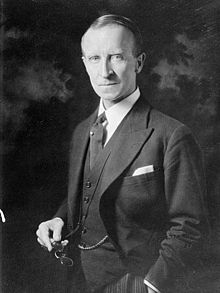
John Buchan, 1st Baron Tweedsmuir (26 August 1875 – 11 February 1940) was a Scottish novelist, poet, and politician who was Governor-General of Canada from 1935 to 1940.
Quotes
[edit]
- The robe of flesh wears thin, and with the years God shines through all things.
- "The Wise Years", The Moon Endureth (1912)
- The task of leadership is not to put greatness into humanity, but to elicit it, for the greatness is already there.
- Montrose and Leadership (1930), p 24; republished in Men and Deeds (1977)
- We can pay our debts to the past by putting the future in debt to ourselves.
- Address to the people of Canada on the coronation of George VI (12 May 1937)
A Lodge in the Wilderness (1906)
[edit]
- Edinburgh and London: William Blackwood and Sons, 1906

- The Simple Life is the last refuge of complicated and restless souls.
- Ch. I, p. 22
- Happiness lies only in a divine unrest; and if you are lapped in comfort you stagnate and miss it.
- Ch. I, p. 23
- In our modern world we have seen inaugurated the reign of a dull bourgeois rationalism, which finds some inadequate reason for all things in heaven and earth and makes a god of its own infallibility.
- Ch. III, p. 69
- It is only a dying cause which can attain to perfect taste.
- Ch. III, p. 83
- Young girls passed me with romance still in their eyes, and others, a little older, with the romance dead.
- Ch. V, p. 145.
- The scene is a society ball in London.
- It was a very happy time, but like all happy times it had no landmarks.
- Ch. X, p. 268
- It was a very young man's confession of faith, and yet there was the glimmering of a truth at the back of it. It was my instinctive protest against the undue simplification of life. We are all a strange compound, and we shall never reach our full stature by starving certain parts of our nature of their due.
- Ch. X, p. 272
- Wise men never grow up; indeed, they grow younger, for they lose the appalling worldly wisdom of youth.
- Ch. XI, pp. 313–4
- What do we mean by spiritual development? Surely, the broadening and deepening of the mind till it regards the world in its true perspective, and the strengthening of the character so that the will is a tempered and unerring weapon in the charge of a man's soul. And this end is to be achieved only by the exercise of the mind upon the largest possible manifold of experience, and by the conflict of character with the alien forces of the world.
- Ch. XII, pp. 336–7
Prester John (1910)
[edit]
- Time, they say, must the best of us capture,
And travel and battle and gems and gold
No more can kindle the ancient rapture,
For even the youngest of hearts grows old.- Dedication
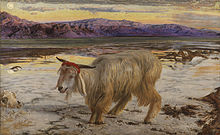
- I mind as if it were yesterday my first sight of the man. Little I knew at the time how big the moment was with destiny, or how often that face seen in the fitful moonlight would haunt my sleep and disturb my waking hours.
- First lines
- Perfect love casteth out fear, the Bible says; but, to speak it reverently, so does perfect hate.
- Ch. IX
- The vows we take in the holy place bind us till we are purged of them at Inanda's Kraal. Till then no blood must be shed and no flesh eaten. It was the fashion of our forefathers.
- Ch. IX
- Fortunately for mankind the brain in a life of action turns more to the matter in hand than to conjuring up the chances of the future.
- Ch. X
- I believe that every man has in his soul a passion for treasure-hunting, which will often drive a coward into prodigies of valour.
- Ch. X
- It was foreordained that I should go alone to Umvelos', and in the promptings of my own infallible heart I believed I saw the workings of Omnipotence. Such is our moral arrogance, and yet without such a belief I think that mankind would have ever been content to bide sluggishly at home.
- Ch. X
- Last night I had looked into the heart of darkness, and the sight had terrified me. What part should I play in the great purification? Most likely that of the Biblical scapegoat.
- Ch. XII
Space (1912)
[edit]- A story in The Moon Endureth

- Supposing you knew — not by sight or by instinct, but by sheer intellectual knowledge, as I know the truth of a mathematical proposition — that what we call empty space was full, crammed. Not with lumps of what we call matter like hills and houses, but with things as real — as real to the mind.
- How if Space is really full of things we cannot see and as yet do not know? How if all animals and some savages have a cell in their brain or a nerve which responds to the invisible world? How if all Space be full of these landmarks, not material in our sense, but quite real? A dog barks at nothing, a wild beast makes an aimless circuit. Why? Perhaps because Space is made up of corridors and alleys, ways to travel and things to shun? For all we know, to a greater intelligence than ours the top of Mont Blanc may be as crowded as Piccadilly Circus.
- I am bound to say that it took me a long time to understand what he meant. He began by saying that everybody thought of Space as an 'empty homogeneous medium.' 'Never mind at present what the ultimate constituents of that medium are. We take it as a finished product, and we think of it as mere extension, something without any quality at all. That is the view of civilised man. You will find all the philosophers taking it for granted. Yes, but every living thing does not take that view.

- I wondered whether the scientific modern brain could not get to the stage of realising that Space is not an empty homogeneous medium, but full of intricate differences, intelligible and real, though not with our common reality.
- I mused upon the ironic fate which had compelled a mathematical genius to make his sole confidant of a philistine lawyer, and induced that lawyer to repeat it confusedly to an ignoramus at twilight on a Scotch hill.
- This crowded world of Space was perfectly real to him. How he had got to it I do not know. Perhaps his mind, dwelling constantly on the problem, had unsealed some atrophied cell and restored the old instinct. Anyhow, he was living his daily life with a foot in each world.
- I gathered from Hollond that he was always conscious of corridors and halls and alleys in Space, shifting, but shifting according to inexorable laws. I never could get quite clear as to what this consciousness was like. When I asked he used to look puzzled and worried and helpless.

- Remember his mind and no other part of him lived in his new world. He said it gave him an odd sense of detachment to sit in a room among people, and to know that nothing there but himself had any relation at all to the infinite strange world of Space that flowed around them. He would listen, he said, to a great man talking, with one eye on the cat on the rug, thinking to himself how much more the cat knew than the man.

- He never went mad in your sense. My dear fellow, you're very much wrong if you think there was anything pathological about him — then. The man was brilliantly sane. His mind was as keen as a keen sword. I couldn't understand him, but I could judge of his sanity right enough.
- 'There's a queer performance going on in the other world,' he said. 'It's unbelievable. I never dreamed of such a thing. I — I don't quite know how to put it, and I don't know how to explain it, but — but I am becoming aware that there are other beings — other minds — moving in Space besides mine.'
- Of course he could only describe his impressions very lamely, for they were purely of the mind, and he had no material peg to hang them on, so that I could realise them. But the gist of it was that he had been gradually becoming conscious of what he called 'Presences' in his world. They had no effect on Space — did not leave footprints in its corridors, for instance — but they affected his mind. There was some mysterious contact established between him and them. I asked him if the affection was unpleasant and he said 'No, not exactly.' But I could see a hint of fear in his eyes.
- I dropped all my own views of sense and nonsense. I told him that, taking all that he had told me as fact, the Presences might be either ordinary minds traversing Space in sleep; or minds such as his which had independently captured the sense of Space's quality; or, finally, the spirits of just men made perfect, behaving as psychical researchers think they do. It was a ridiculous task to set a prosaic man, and I wasn't quite serious.
- 'Think,' I told him, 'what may be waiting for you. You may discover the meaning of Spirit. You may open up a new world, as rich as the old one, but imperishable. You may prove to mankind their immortality and deliver them for ever from the fear of death. Why, man, you are picking at the lock of all the world's mysteries.'
- Leithen's story had bored and puzzled me at the start, but now it had somehow gripped my fancy. Space a domain of endless corridors and Presences moving in them! The world was not quite the same as an hour ago. It was the hour, as the French say, "between dog and wolf," when the mind is disposed to marvels.
- Oh, I agree he went mad in the end. It is the only explanation. Something must have snapped in that fine brain, and he saw the little bit more which we call madness. Thank God, you and I are prosaic fellows...
Salute to Adventurers (1915)
[edit]- 'I'm in the Lord's hands,' he said humbly. 'I'm but a penny whistle for His breath to blow on.' This he said with such solemnity that the meaning of a fanatic was suddenly revealed to me. One or two distorted notions, a wild imagination, and fierce passions, and there you have the ingredients ready.
- Ch. 3 "The Canongate Tollbooth"
- They were happy years, the four I spent in Glasgow, for I was young and ardent, and had not yet suffered the grave miscarriage of hope which is our human lot.
- Ch. 4 "Of a Stairhead and a Sea-Captain"
- I never mind choler in a man if he have also honesty and good sense.
- Ch. 6 "Tells of My Education"
- There come moments to every man when he is thankful to be alive, and every breath drawn is a delight; so at that hour I praised my Maker for His good earth, and for sparing me to rejoice in it.
- Ch. 16 "The Ford of the Rapidan"
- There comes a time to everyone when the world narrows for him to a strait alley, with Death at the end of it, and all his thoughts are fixed on that waiting enemy of mankind.
- Ch. 24 "I Suffer the Heathen's Rage"
- 'What does a woman desire?' she asked, speaking as if to herself, and her voice was soft as she gazed over the valley. 'Men think it is a handsome face or a brisk air or a smooth tongue. And some will have it that it is a deep purse or a high station. But I think it is the honest heart that goes all the way with a woman's love. We are not so blind as to believe that the glitter is the gold. We love romance, but we seek it in its true home.'
- Ch. 28 "How Three Souls Found Their Heritage"
The Power-House (1916)
[edit]

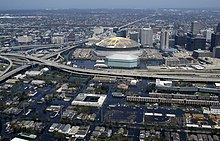
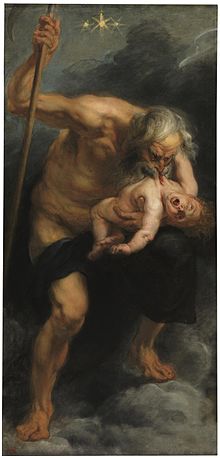
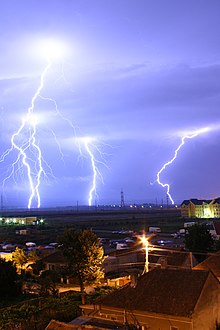
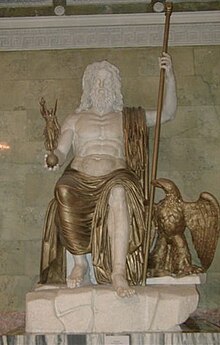
- I once played the chief part in a rather exciting business without ever once budging from London. And the joke of it was that the man who went out to look for adventure only saw a bit of the game, and I who sat in my chambers saw it all and pulled the strings. 'They also serve who only stand and wait,' you know.
- Preface
- I must get off for a bit or I'll bonnet Joggleberry or get up and propose a national monument to Guy Fawkes or something silly.
- Ch. 1 "Beginning of the Wild-Goose Chase"
- He was a bad acquaintance for a placid, sedentary soul like me, for though he could work like a Trojan when the fit took him, he was never at the same job very long. In the same week he would harass an Under-Secretary about horses for the Army, write voluminously to the press about a gun he had invented for potting aeroplanes, give a fancy-dress ball which he forgot to attend, and get into the semi-final of the racquets championship. I waited daily to see him start a new religion.
- Ch. 1 "Beginning of the Wild-Goose Chase"
- You don't know old Charles as I know him. He's got into a queer set, and there's no knowing what mischief he's up to. He's perfectly capable of starting a revolution in Armenia or somewhere merely to see how it feels like to be a revolutionary. That's the damned thing about the artistic temperament.
- Ch. 1 "Beginning of the Wild-Goose Chase"
- To be watchful, I decided, was my business. And I could not get rid of the feeling that I might soon have cause for all my vigilance.
- Ch. 1 "Beginning of the Wild-Goose Chase"
- Every man at the bottom of his heart believes that he is a born detective.
- Ch. 2 "I First Hear Of Mr Andrew Lumley"
- You think that a wall as solid as the earth separates civilization from barbarism. I tell you the division is a thread, a sheet of glass. A touch here, a push there, and you bring back the reign of Saturn.
- Ch. 3 "Tells of a Midsummer Night"
- Civilisation is a conspiracy. What value would your police be if every criminal could find a sanctuary across the Channel, or your law courts, if no other tribunal recognised their decisions? Modern life is the silent compact of comfortable folk to keep up pretences. And it will succeed till the day comes when there is another compact to strip them bare.
- Ch. 3 "Tells of a Midsummer Night"
- Civilisation needs more than the law to hold it together. You see, all mankind are not equally willing to accept as divine justice what is called human law.
- Ch. 3 "Tells of a Midsummer Night"
- When all is said, we are ruled by the amateurs and the second-rate. The methods of our departments would bring any private firm to bankruptcy. The methods of Parliament — pardon me — would disgrace any board of directors. Our rulers pretend to buy expert knowledge, but they never pay the price for it that a business man would pay, and if they get it they have not the courage to use it. Where is the inducement for a man of genius to sell his brains to our insipid governors?
And yet knowledge is the only power — now as ever. A little mechanical device will wreck your navies. A new chemical combination will upset every rule of war. It is the same with our commerce. One or two minute changes might sink Britain to the level of Ecuador, or give China the key of the world's wealth. And yet we never dream that these things are possible. We think our castles of sand are the ramparts of the universe.- Ch. 3 "Tells of a Midsummer Night"
- I read now and then in the papers that some eminent scientist had made a great discovery. He reads a paper before some Academy of Science, and there are leading articles on it, and his photograph adorns the magazines. That kind of man is not the danger. He is a bit of the machine, a party to the compact. It is the men who stand outside it that are to be reckoned with, the artists in discovery who will never use their knowledge till they can use it with full effect.
- Ch. 3 "Tells of a Midsummer Night"
- You may hear people say that submarines have done away with the battleship, and that aircraft have annulled the mastery of the sea. That is what our pessimists say. But do you imagine that the clumsy submarine or the fragile aeroplane is really the last word of science?
- Ch. 3 "Tells of a Midsummer Night"
- You see only the productions of second-rate folk who are in a hurry to get wealth and fame. The true knowledge, the deadly knowledge, is still kept secret. But, believe me, my friend, it is there.
- Ch. 3 "Tells of a Midsummer Night"
- I cannot pry into motives. I only know of the existence of great extra-social intelligences. Let us say that they distrust the machine. They may be idealists and desire to make a new world, or they may simply be artists, loving for its own sake the pursuit of truth. If I were to hazard a guess, I should say that it took both types to bring about results, for the second find the knowledge and the first the will to use it.
- Ch. 3 "Tells of a Midsummer Night"
- If those extra-social brains are so potent, why after all do they effect so little? A dull police-officer, with the machine behind him, can afford to laugh at most experiments in anarchy.
- Ch. 3 "Tells of a Midsummer Night"
- Civilisation knows how to use such powers as it has, while the immense potentiality of the unlicensed is dissipated in vapour. Civilisation wins because it is a world-wide league; its enemies fail because they are parochial. But supposing … supposing anarchy learned from civilisation and became international. Oh, I don't mean the bands of advertising donkeys who call themselves International Unions of Workers and suchlike rubbish. I mean if the real brain-stuff of the world were internationalised. Suppose that the links in the cordon of civilisation were neutralised by other links in a far more potent chain. The earth is seething with incoherent power and unorganised intelligence.
- Ch. 3 "Tells of a Midsummer Night"
- "It would scarcely be destruction," he replied gently. "Let us call it iconoclasm, the swallowing of formulas, which has always had its full retinue of idealists. And you do not want a Napoleon. All that is needed is direction, which could be given by men of far lower gifts than a Bonaparte. In a word, you want a Power-House, and then the age of miracles will begin."
- Ch. 3 "Tells of a Midsummer Night"
- I was a peaceful sedentary man, a lover of a quiet life, with no appetite for perils and commotions. But I was beginning to realise that I was very obstinate.
- Ch. 4 "I Follow The Trail Of The Super-Butler"
- I am not courageous. To be brave means that you have conquered fear, but I have never had any fear to conquer. Believe me, Mr Leithen, I am quite impervious to threats. You come to me to-night and hold a pistol to my head. You offer me two alternatives, both of which mean failure. But how do you know that I regard them as failure? I have had what they call a good run for my money. No man since Napoleon has tasted such power. I may be willing to end it. Age creeps on and power may grow burdensome. I have always sat loose from common ambitions and common affections. For all you know I may regard you as a benefactor.
- Ch. 8 "The Power-House"
- I felt myself in the presence of something enormously big, as if a small barbarian was desecrating the colossal Zeus of Pheidias with a coal hammer. But I also felt it inhuman, and I hated it, and I clung to that hatred.
"You fear nothing and you believe nothing," I said. "Man, you should never have been allowed to live."- Ch. 8 "The Power-House"
- I am a sceptic about most things... but, believe me, I have my own worship. I venerate the intellect of man. I believe in its undreamed-of possibilities, when it grows free like an oak in the forest and is not dwarfed in a flower-pot. From that allegiance I have never wavered. That is the God I have never forsworn.
- Ch. 8 "The Power-House"
The Path of the King (1921)
[edit]

- We look for romance in the well-cultivated garden-plots, and when it springs out of virgin soil we are surprised, though any fool might know it was the natural place for it.
- Prologue
- The things we call aristocracies and reigning houses are the last places to look for masterful men. They began strongly, but they have been too long in possession. They have been cosseted and comforted and the devil has gone out of their blood. Don't imagine that I undervalue descent. It is not for nothing that a great man leaves posterity. But who is more likely to inherit the fire — the elder son with his flesh-pots or the younger son with his fortune to find?
- Prologue
- We none of us know our ancestors beyond a little way. We all of us may have kings' blood in our veins.
- Prologue
- The spark once transmitted may smoulder for generations under ashes, but the appointed time will come, and it will flare up to warm the world. God never allows waste. And we fools rub our eyes and wonder, when we see genius come out of the gutter. It didn't begin there. We tell ourselves that Shakespeare was the son of a woolpedlar, and Napoleon of a farmer, and Luther of a peasant, and we hold up our hands at the marvel. But who knows what kings and prophets they had in their ancestry!
- Prologue
- Generations follow, oblivious of the high beginnings, but there is that in the stock which is fated to endure. The sons and daughters blunder and sin and perish, but the race goes on, for there is a fierce stuff of life in it. It sinks and rises again and blossoms at haphazard into virtue or vice, since the ordinary moral laws do not concern its mission. Some rags of greatness always cling to it, the dumb faith that sometime and somehow that blood drawn from kings it never knew will be royal again. Though nature is wasteful of material things, there is no waste of spirit. And then after long years there comes, unheralded and unlooked-for, the day of the Appointed Time...
- Prologue
- Bethink you of the blessedness. Every wife is like the Mother of God—she has the hope of bearing a saviour of mankind. She is the channel of the eternal purpose of Heaven.
- Ch. V "The Maid"
- Every wife is like Mary the Blessed and may bear a saviour of mankind. The road is long, but the ways of Heaven are sure.
- Ch. V "The Maid"
- I think a man cannot strive wholeheartedly with an enemy unless he have much in common with him, and as the strife goes on he gets liker.
- Ch. VIII "The Hidden City"
- I have known fellows to whom the earth was so full of little pleasures that after the worst clouts they rose like larks from a furrow. A wise philosophy—but I had none of it. I always saw the little pageant of man's life like a child's peep-show beside the dark wastes of eternity.
- Ch. VIII "The Hidden City"
- The promise had not failed her. . . . She had won everything from life, for she had given the world a master. Words seemed to speak themselves in her ear. . . . "Bethink you of the blessedness. Every wife is like the Mother of God and has the hope of bearing a saviour of mankind."
- Ch. XIII "The Last Stage"
- Truth's like a dollar-piece, it's got two sides, and both are wanted to make it good currency.
- Ch. XIV "The End of the Road", I
- The law and the constitution are like a child's pants. They've got to be made wider and longer as the child grows so as to fit him. If they're kept too tight, he'll burst them; and if you're in a hurry and make them too big all at once, they'll trip him up.
- Ch. XIV "The End of the Road", I
- If the Lord sends us war, we have got to face it like men, but God forbid we should manufacture war, and use it as an escape from our domestic difficulties. You can't expect a blessing on that.
- Ch. XIV "The End of the Road", II
- Most true points are fine points. There never was a dispute between mortals where both sides hadn't a bit of right.
- Ch. XIV "The End of the Road", II
- They want to hurry things quicker than the Almighty means them to go. I don't altogether blame them either, for I'm mortally impatient myself. But it s no good thinking that saying a thing should be so will make it so. We're not the Creator of this universe. You've got to judge results according to your instruments.
- Ch. XIV "The End of the Road", III
Huntingtower (1922)
[edit]- The clean delicate lines of her figure, the exquisite pure colouring of hair and skin, the charming young arrogance of the eyes — this was beauty, he reflected, a miracle, a revelation. Her virginal fineness and her dress, which was the tint of pale fire, gave her the air of a creature of ice and flame.
- Prologue
- Her voice had a thrill in it like music, frosty music.
- Prologue
- They[Australians]'ve all kinds of accents, but you can never mistake their voice. It's got the sun in it. Canadians have got grinding ice in theirs, and Virginians have got butter. So have the Irish. In Britain there are no voices, only speaking-tubes.
- Ch. 2
- What had become of his dream of idylls, his gentle bookish romance? Vanished before a reality which smacked horribly of crude melodrama and possibly of sordid crime. His gorge rose at the picture, but a thought troubled him. Perhaps all romance in its hour of happening was rough and ugly like this, and only shone rosy in the retrospect. Was he being false to his deepest faith?
- Ch. 4
- It was as if he were watching a tall stranger with a wand pointing to the embarrassed phantom that was himself, and ruthlessly exposing its frailties! And yet that pitiless showman was himself too — himself as he wanted to be, cheerful, brave, resourceful, indomitable.
- Ch. 6
- And yet — and yet! He had done the right thing, though the Lord alone knew how it would end. He began to pluck courage from his very melancholy, and hope from his reflexions on the transitoriness of life. He was austerely following Romance as he conceived it, and if that capricious lady had taken one dream from him she might yet reward him with a better.
- Ch. 6
- Oh, it sounds ridiculous, I know, in Britain in the twentieth century, but I learned in the war that civilization anywhere is a very thin crust.
- Ch. 9
- He looked up startled, and saw in her face that which gave him a view into a strange new world. He had thought that women blushed when they talked of love, but her eyes were as grave and candid as a boy's. Here was one who had gone through waters so deep that she had lost the foibles of sex. Love to her was only a word of ill omen, a threat on the lips of brutes, an extra battalion of peril in an army of perplexities.
- Ch. 10
Midwinter (1923)
[edit]- I am nothing — a will-o'-the-wisp at your service — a clod of vivified dust whom its progenitors christened Amos Midwinter. I have no possession but my name, and no calling but that of philosopher. Naked I came from the earth, and naked I will return to it.
- Ch. I
- [L]oyalty and religion have many meanings, and self-interest is a skilled interpreter.
- Ch. I
- Statesmanship […] must consider first the fortunes of the common people. No statesman has a right to risk these fortunes unless he be reasonably assured of success.
- Ch. II
- Boldness, and still boldness, was the only wisdom. To be cautious was to be rash.
- Ch. X
- What can stand against loyalty? It is the faith that moves mountains.
- Ch. X
- Too young for wife, too old for child, but the ripe age for comrade — and such a comrade, for there was a boy's gallantry in her eyes and something of a child's confident fearlessness.
- Ch. XVII
- Now it was all behind him — but by God, he did not, he would not regret it. He had taken the only way, and if it had pleased Fate to sport cruelly with him, that was no fault of his. He had sacrificed one loyalty to a more urgent, and with the thought bitterness went out of his soul.[…] Tragedy had ensued, but the endeavour had been honest. He saw the ironic pattern of life spread out beneath him, as a man views a campaign from a mountain, and he came near to laughter — laughter with an undertone of tears.
- Ch. XVIII
Witch Wood (1927)
[edit]- Honest intention will not cure faulty practice.
- Ch. III "Guests in Calidon Tower"
- The profession of religion was not the same thing as godliness, and he was coming to doubt whether the insistence upon minute conformities of outward conduct and the hair-splitting doctrines were not devices of Satan to entangle souls.
- Ch. VIII "The Second Blast"
- And at times I'm tempted to think that our way and the Kirk's way is not God's way, for we're apt to treat the natural man as altogether corrupt, and put him under over-strict pains and penalties, whereas there's matter in him that might be shaped to the purposes of grace. If there's original sin, there's likewise original innocemce.
- Ch. IX "Before Lammas"
- If the Kirk confines human nature too strictly, it will break out in secret ways, for men and women are born into a terrestrial world, though they have hopes of Heaven.
- Ch. X "What the Moon Saw"
- [T]here was never an army that did not accuse its enemies of barbarity.
- Ch. XIII "White Magic"
- [A] falsehood, which may be pardoned if it is to save another, is black sin if used by a coward to save himself.
- Ch. XIV "The Counterblast"
- I am a minister of Christ first and of the Kirk second. If the Kirk forgets its Master's teaching, we part company.
- Ch. XIV "The Counterblast"
- [T]he Kirk of Scotland as at present guidit […] is a kind o' Papery wi' fifty Papes instead o' ane.
- Ch. XVII "Woodilee and Calidon"
Castle Gay (1930)
[edit]- He knew nothing accurately about any subject in the world, but he could clothe his ignorance in pontifical garments and give his confusion the accents of authority. He had a remarkable flair for discerning and elaborating the tiny quantum of popular knowledge on any matter.
- Ch. 2
- [On the newspapers of the Craw Press:] Their politics are an opiate to prevent folk thinking.
- Ch. 3
- Mrs. Brisbane-Brown was a relic, but only the unthinking would have called her a snob. For snobbishness implies some sense of insecurity, and she was perfectly secure.
- Ch. 6
- The Scottish Communist is a much misunderstood person. When he is a true Caledonian, and not a Pole or an Irishman, he is simply the lineal descendant of the old Radical. The Scottish Radical was a man who held a set of inviolable principles on which he was entirely unable to compromise. It did not matter what the principles were; the point was that they were like the laws of Sinai, which could not be added to or subtracted from. When the Liberal party began to compromise, he joined Labour; when Labour began to compromise, by a natural transition he became a Communist. Temperamentally he has not changed. He is simply the stuff which in the seventeenth century made the unyielding Covenanter, and in the eighteenth the inflexible Jacobite. He is honesty incarnate, but his mind lacks flexibility.
- Ch. 14
- [W]ithout humour you cannot run a sweetie-shop, let alone a nation.
- Ch. 19
- He realised how oddly detached he was.[…] He enjoyed every moment, but he knew that his enjoyment came largely from standing a little apart. He was not a cynic, for there was no sourness in him. He had a kindliness towards most things, and a large charity. But he did not take sides. He had not accepted any mood, or creed, or groove of his own. Vix ea nostra voco [I scarcely call these things our own] was his motto. He was only a seeker […] occupied in finding out what was in his soul.
- Ch. 20
The Blanket of the Dark (1931)
[edit]- [W]isdom is apt to cohabit with oddity.
- Ch. IV
- [Y}outh is a hard judge.
- Ch. X
- I incline to the belief that in the light of eternity all our truths are shadows, and that the very truth we shall only know hereafter. Yet I think that every truth in its own place is a substance, though it may be a shadow in another place. And I think that all such shadows have value for our souls, for each is a true shadow, as the substance is a true substance.
- Ch. X
- There is a madness that is better than wisdom.
- Ch. XIII
The House of the Four Winds (1935)
[edit]

- He had never been lonely in his life before he met her, having at the worst found good company in himself; but now he longed for a companion, and out of all the many millions of the earth's inhabitants there was only one that he wanted.
- Prologue
- I always try to suit my clothes to my company. It is the only way to be inconspicuous.
- Prologue
- If anyone makes trouble I've advised him to dot him one on the jaw in the best British style.
- Ch. III
- "You can help me to keep my head cool," was the answer. "You stand for the world of common sense which will always win in the long run. When I'm inclined to run amok you'll remind me of England. You'll lower the temperature."
- Ch. IV
- He knew less about women than he knew about the physics of hyperspace.
- Ch. XI
- It's the Idea that wins every time — the Idea with brains and guts behind it.
- Envoi
Augustus (1937)
[edit]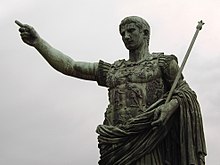

- History does not repeat itself except with variations, and it is idle to look for exact parallels, but we can trace a resemblance between the conditions of his time and those of to-day. Once again the crust of civilization has worn thin, and beneath can be heard the muttering of primeval fires. Once again many accepted principles of government have been overthrown, and the world has become a laboratory where immature and feverish minds experiment with unknown forces. Once again problems cannot be comfortably limited, for science has brought the nations into an uneasy bondage to each other. In the actual business of administration there is no question of today which Augustus had not to face and answer.
- If his "magna imago" could return to earth, he would be puzzled at some of our experiments in empire, and might well complain that the imperfections of his work were taken as its virtues, and that so many truths had gone silently out of mind. He had prided himself on having given the world peace, and he would be amazed by the loud praise of war as a natural and wholesome concomitant of a nation's life. Wars he had fought from an anxious desire to safeguard his people, as the shepherd builds the defences of his sheepfold; but he hated the thing, because he knew well the deadly "disordering," which the Greek historian noted as the consequence of the most triumphant campaign. He would marvel, too, at the current talk of racial purity, the exaltation of one breed of men as the chosen favourites of the gods. That would seem to him not only a defiance of the new Christian creed, but of the Stoicism which he had sincerely professed.
- The Augustan constitution remains one of the major products of the human intelligence. It was a whole into which the parts fitted smoothly, but both whole and parts were elastic and capable of swift adaptation to unforeseen conditions. It was elaborate, but that was necessary, both because of its origin and its purpose.
- Any large-scale organization must lose some of the merits of its rudimentary beginnings. Quantity will have a coarsening effect on quality.
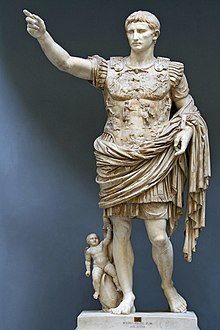
- There is no merit in an empire as such. Extension in space does not necessarily mean spiritual advancement. The small community is easier to govern, and, it may well be, more pleasant to live in. If its opportunities are limited its perils are also circumscribed. But the alternatives which confronted him were empire or anarchy.
- The Athenian empire lasted for fifty years at the most, and the stupendous creation of Alexander the Great for less. What has been the fate of succeeding imperialisms? That of Spain endured on the grand scale for little more than a century; that of Napoleon for a decade; the British Empire is less than two centuries old, and in its present form is a thing of yesterday. In the brief span of recorded history empires have had a shorter life than many monarchies, theocracies, and even republics. The Augustan alone reached a venerable age. In the coming of Christianity it had to face the greatest of all historic convulsions, but such was its potency that it weathered the storm and influenced profoundly the organization of the Christian church.
- The true achievement of Augustus is that he saved the world from disintegration. Without him Rome must have lost her conquests one by one, and seen them relapse into barbarism or degenerate into petty satrapies. The wild peoples of the East and North would have ante-dated their invasions by centuries.
- It is due to him that the Roman concepts of public duty and service are still a living force among us. Historians have denied him the name of genius which they grant readily to Alexander and Julius and Napoleon; but if it be not genius to re-make and re-direct the world by a courageous realism and supreme powers of character and mind, then the word has no meaning in human speech..
Memory Hold-The-Door (1940)
[edit]
- US title: Pilgrim's Way: An Essay in Recollection (1940)
- He disliked emotion, not because he felt lightly, but because he felt deeply.
- Pilgrim's Way (1940), p. 58
- Peace is that state in which fear of any kind is unknown.
- Pilgrim's Way (1940), p. 117
- There may be Peace without Joy, and Joy without Peace, but the two combined make Happiness.
- Pilgrim's Way (1940), p. 117
- Now that the once omnipotent Liberal party has so declined, it is hard to realise how formidable it was in 1911—especially in Scotland. Its dogmas were so completely taken for granted that their presentation partook less of argument than of a tribal incantation. Mr. Gladstone had given it an aura of earnest morality, so that its platforms were also pulpits and its harangues had the weight of sermons. Its members seemed to assume that their opponents must be lacking either in morals or mind. The Tories were the "stupid" party; Liberals alone understood and sympathised with the poor; a working man who was not a Liberal was inaccessible to reason, or morally corrupt, or intimidated by laird or employer. I remember a lady summing up the attitude thus: Tories may think they are better born, but Liberals know that they are born better.
- The true definition of a snob is one who craves for what separates men rather than for what unites them.
- Pilgrim's Way (1940), p. 241
- Public life is regarded as the crown of a career, and to young men it is the worthiest ambition. Politics is still the greatest and the most honorable adventure.
- Pilgrim’s Way (1940)
Canadian Occasions (1940)
[edit]

- The world was arrogant and self-satisfied, but behind all this confidence there was an uneasy sense of impending disaster. The old creeds, both religious and political, were largely in the process of dissolution, but we did not realise the fact, and therefore did not look for new foundations.
- "A University's Bequest to Youth" Speech in Toronto (10 October 1936)
- We had our pride shattered, and without humility there can be no humanity.
- "A University's Bequest to Youth" (10 October 1936)
- A great storm destroys much that is precious, but it may also clear the air and blow down trees which might have been obscuring the view and making our life stuffy, and reveal in our estate possibilities of development that we had not thought of.
- "A University's Bequest to Youth" (10 October 1936)
- To-day we have fewer dogmas, but I think that we have stronger principles. By a dogma I mean a deduction from facts which is only valid under certain conditions, and which becomes untrue if those conditions change. By a principle I mean something that is an eternal and universal truth.
- "A University's Bequest to Youth" (10 October 1936)
- Our sufferings have taught us that no nation is sufficient unto itself, and that our prosperity depends in the long run, not upon the failure of our neighbors but their successes.
- "A University's Bequest to Youth" (10 October 1936)
- I have heard an atheist defined as a man who had no invisible means of support.
- A play on words commonly used referring to vagrants or paupers as having "no visible means of support" financially, speaking to the Law Society of Upper Canada, (21 February 1936); published in Canadian Occasions (1940), p. 201. Buchan's source for this definition remains unknown. The witticism was repeated by Harry Emerson Fosdick in his On Being a Real Person (1943), ch. 1, with due acknowledgement to Buchan, and was again used by Archbishop Fulton J. Sheen in Look magazine (December 14, 1955). The credit for this line is therefore often wrongly given to Fosdick or to Sheen. Credit has also been given to the conductor Walter Damrosch (1862-1950).
Misattributed
[edit]- He who would valiant be against all disaster;
Let him in constancy
Follow the Master.
There's no discouragement
Shall make him once relent;
His first avowed intent
To be a pilgrim.- This has appeared on the internet attributed to Buchan, but is actually John Bunyan, as quoted in The Westminster Collection of Christian Quotations (2001) by Martin H. Manser
- Prayer opens the heart to God, and it is the means by which the soul, though empty, is filled by God.
- This has similarly been attributed to Buchan, but is actually a misrendering of a sentence from the first paragraph of John Bunyan, Discourse on Prayer. Bunyan's original sentence reads: "It is the opener of the heart of God, and a means by which the soul, though empty, is filled."
- The best prayers have often more groans than words.
- This has also been attributed to Buchan, but is again from John Bunyan, Discourse on Prayer.
Quotes about
[edit]- Alongside politicians and the press, writers of fiction picked up the theme of a sinister Communist threat, a theme that drew on the intelligence wars between the Soviet Union and the West. John Buchan, a Scottish novelist who had served in intelligence during World War One before becoming an MP, saw the hidden hand of a Communist plot to take over the world. In her novel The Big Four (1927), Agatha Christie, a successful British novelist, referred to ‘the world-wide unrest, the labour troubles that beset every nation, and the revolutions that break out in some’. The sense of menace played an important role in imaginative fiction. It took forward the pre-war strand of spy fiction, but added a theme of social disorder. There was also frequently a racial dimension, with a tendency to depict hostile figures as Slav and Jewish, frequently in league with sinister elements in British (or French or American) society. This theme drew on a broader hostility to Jews that was given renewed energy by the association of the Russian Revolution in hostile eyes with them. Russian émigrés spread this assessment. In turn, there was similar material in the Soviet Union about Western plots to overthrow the Revolution, a theme that long continued.
- Jeremy Black, The Cold War: A Military History (2015)



